- Home
- Brandon Sanderson
The Dark Talent Page 3
The Dark Talent Read online
Page 3
“Ah, and the brother,” Shasta said, glancing at Kaz. “I hope you’re not planning on bringing him, Alcatraz. It was to be only us three. You, me, Leavenworth.”
“And anyone else you approve.”
“Then I don’t approve Kazan.”
“Fine,” I said, meeting my mother’s gaze. “Kaz, tell Grandpa to power down the penguin. We’re not going anywhere.”
Shasta stared back at me, arms folded. “You’ve changed,” she finally said. “You’re harder now. I applaud that. Very well, Kazan may join us. Let’s be moving.”
No matter what situation my mother was in, she always seemed to be able to control it. She even made prison seem like a deliberate choice. Though … that might make sense. If you think about it, prison involves free food, a room all to yourself (so long as you are insistent about it), and a bunch of like-minded individuals with whom to make friends. Beyond that, all of the really hardcore criminals are too skillful to be caught, so you’ll be safe from them inside the prison.
Of course, if you’ve been doing all the things I tell you to in these books, you’re probably already in prison. To be honest, it’s a wonder to me that I haven’t spent most of these books locked up myself.*
Mother in tow, we headed back for the landing field. The missiles continued to fall—in fact, one exploded high above us, leaving me confused. Another malfunction? But no—this one dropped little parachutes bearing small, spiderlike machines, each the size of a basketball. These landed, then began to rip apart buildings, attacking them with lasers on their forelegs.
The Librarians knew everyone would evacuate. Now they were going to level the city with robots while the people were all hiding.
“This is what you’re part of,” I snapped at my mother. “This is what you support.”
“Don’t be tiresome, Alcatraz. I don’t support everything the Librarians do any more than you support everything the Free Kingdoms—and their monarchs—do.”
We pulled to a stop as Kaz waved for us to wait beside a broken hut. He looked out, watching a group of spider robots scramble past.
“Yeah?” I whispered to my mother as we waited. “You dress like a Librarian, talk like one. You work with them, and don’t speak out against them. You’re one of them. And you share responsibility for this.”
“You think I could simply leave the Hushlands behind? Join the Free Kingdoms?”
“It’s what I did.”
“Oh, so you’re a Free Kingdomer now?” my mother asked. “Do you think like them? Act like them? You don’t miss things like hamburgers and blue jeans?”
“I…”
“You’re not one of them, Alcatraz. A few months of irresponsible playing with your grandfather won’t erase a decade and a half of living in the Hushlands. You—”
I couldn’t talk to her. I moved as soon as Kaz nodded to us, and I outpaced the other two, angry. It probably wouldn’t have hurt so much if it hadn’t had a grain of truth to it.
Even still, I didn’t know where I belonged. I felt like an outsider in the Free Kingdoms; I rarely understood what was going on or why people did what they did. Yet I certainly didn’t miss the Hushlands as much as my mother wanted to imply. Burgers and jeans were great and all, but I’d never be able to live there in peace, knowing what I now knew of the world.
Was I destined to spend my life without a real home? Had anything changed from the days when I’d moved from family to family, like a bad smell through a crowded room?
I hated that my mother could get to me. I hated that she could be wrong, yet still be just right enough to get under my skin. Also I hated asparagus. But that’s not particularly relevant now, so I’m not sure why I brought it up.
I was charging so quickly that I didn’t notice the group of spider things gathering together up ahead, clicking to one another and gesturing at our little group. Kaz cried out, grabbing one of his guns. We were almost back to the landing field—we’d reached the place where that first missile had fallen, but not exploded.
“Lovely,” my mother said, stepping up beside me and regarding the bunch of robots. “You threw a tantrum and ran us into this. You are still a child, Alcatraz. Don’t forget that, just because the Nalhallans are willing to send thirteen-year-old kids into war zones.”
“Better than trying to crush their spirits,” I said, “letting them think they were orphans. Never telling them who you were.”
“Oh? And was your father any better? Your grandfather? At least I looked out for you.”
“Because you wanted the Sands of Rashid,” I said. “Not because you cared about me. You—”
“I’m your mother,” Shasta said. “You will not speak to me in such a way.”
“Uh, guys?” Kaz said. “Robot death army! Guys?”
“You’re not my mother,” I said. “You’re merely the woman who gave birth to me—and I’m surprised you didn’t find a surrogate for that endeavor! You seem to be content to avoid all the other hard work associated with raising a child!”
Shasta folded her arms.
“As for being young,” I said, kneeling down, “yeah, I’m aware. Doesn’t mean I haven’t figured out a few things.” I pressed my hand against the unexploded missile on the ground beside us, sending a surge of Oculator energy into it.
The rocket came alive, glowing white, a jet of flame shooting out the back. It burst away from me and slammed into the approaching pack of robots, then exploded. The blast was far enough from us that we weren’t hurt, but the robots weren’t so lucky; it probably sent little bits of them flying as far as Mongolia.
I blinked in shock. I hadn’t been expecting the thing to explode; I’d planned for it to push through the robots and make a path. So it hadn’t been a dud after all? And I’d knelt down and touched the thing?
My mother didn’t so much as cringe as the pieces of robots fell around us, and she seemed completely unimpressed by my awesome robot-destroying skills.
“You’re as bad as your father,” she said.
“So now I’m like the Free Kingdomers?” I said, shaken.
“Don’t be silly,” Shasta said, striding away from me. “Your father never fit in here either. He never fit in anywhere. It’s part of what I like about him.”
Troubled, I followed until we reached the airfield, which had collected some smoldering holes during our absence. The enormous glass penguin stood in their midst like the last flag flapping on a battlefield, only far dumber-looking.
My grandfather’s torso poked out of a window about where the penguin’s navel would have been, if it were a glass mammal instead of a glass bird. “Colliding Kowals!” he yelled at us. “What took you so long? Get in, get in! Oh, and by the way, Shasta, I’m giving this penguin to you!”
“Giving it to me?” she shouted up at him as we reached the base of the penguin. “Why in the world would you do that?”
“Because I promised my grandson we’d steal a ship to ride out,” Grandpa yelled back, “and we can’t very well do that if we own the blasted thing. So it’s yours. Incidentally, we’re stealing it. Onward!” He pulled back into the penguin.
Kaz led us up a stairway into the base of the penguin. Within, the vehicle consisted of lots of steps and small rooms off to the sides. An elevator would have been lovely, but Free Kingdomers have this strange idea about steps being more advanced than something like elevators. Don’t ask me to explain it again—it really doesn’t make much sense.
After a lot of climbing, we reached the head of the penguin, where the eyes acted like a windshield for us to look out of. “Welcome to Penguinator!” Grandpa said from a bucket seat next to a window.
“Penguinator?” Shasta said flatly.
“Named it myself!” Grandpa said.
“I couldn’t tell.” Shasta settled down in one of the seats, and Kaz took the seat nearest the eye-windows. He’d be our pilot. He flipped some switches and the entire vessel rattled, a hum coming from down below.
I remained standing, lea
ning back against a glass wall. I’d come to Mokia in a flash, on a quest equal parts determination and desperation. I’d barely gotten to see the place, despite wearing its crown, and now I was off again.
That was my life. I’d only been in Nalhalla for a few months before leaving for Mokia, and now I was off back to the Hushlands.
Where did I belong?
Penguinator vibrated more violently. The way Free Kingdomer vehicles worked, the entire thing was made of glass, but it wasn’t a hundred percent transparent.
“Alcatraz?” Kaz asked. “You going to sit down?”
“I think I’ll stand.”
“Might not be safe,” Kaz said, pulling a lever. The vehicle shook as an explosion came from nearby. Missiles were still falling on the city.
“We going to rock a lot as we waddle to the ocean?” I asked, settling down in a glass seat.
“Waddle?” Grandpa asked. “Don’t tell me you believe Librarian penguin propaganda.”
“Flightless sea fowl?” I asked. “Adorable and silly? I’ve seen them at zoos.”
“Those are the juveniles,” Grandpa said. “Not fully grown.”
“Uh … and what are the adults like?”
The entire room rotated unexpectedly; the penguin’s head was turning up toward the sky.
Something rumbled down below.
“Well,” Grandpa said, “we’ve tried to replicate their biological jet boosters. Unfortunately, we haven’t ever been able to match their natural airspeed. But I believe they were the original inspiration that made Librarian scientists create the first rockets.”
“That’s—”
The rest of what I was going to say was lost as the giant glass penguin exploded out of Mokia and shot into the air.
Chapter
Bob
I admit nothing.
You might say that my dialogue in these books sounds too heroic at times to be real. “Alcatraz,” you say to me, “real people, particularly teenagers, don’t say things like ‘You’re merely the woman who gave birth to me—and I’m surprised you didn’t find a surrogate for that endeavor.’” To which I reply, “Stop reading over my shoulder as I type. And how did you get into my house anyway?”
I’ve told you before, and I guess I need to reiterate, that everything in these biographies is one hundred percent true and not altered in any way. Yes, a real teenage boy talking to his mother might have said, “Uh, you’re stupid. And stuff.” Fortunately, I’m far more eloquent.
And if you don’t believe me, well, uh, you’re stupid. And stuff.
Penguinator’s blastoff shoved me back in my seat. I could practically feel my skin pulling back from my mouth and eyes as we zoomed upward. Missiles fell around us, trailing smoke, but somehow—whether by luck or clever flying—we missed colliding with any of them. I was quite pleased by that fact. I hate exploding so early in the day.*
Kaz let out a whoop as we streaked away from Mokia. I let out a gurgle that was meant as a cross between a philosophic representation of my disgust for all things Librarian and a wish that I’d thought to use the bathroom before climbing aboard.
Eventually the machine leveled out in the sky, turning horizontal like a jet plane—a giant glass jet plane shaped like a penguin with a large flame shooting out of its butt. These are the kinds of classy moments the Librarians try to prevent you from reading, kids.
“What are we looking at for the flight time?” Grandpa asked once we’d leveled out.
“Maybe an hour,” Kaz said.
I checked the clock on the dashboard. That would put us at about one in the afternoon when the Librarian defenses around Washington, DC, blew us up. Much better.
“Any ideas on how we’re going to get in?” Kaz asked.
“Something will come up,” Grandpa said cheerfully.
“You always say things like that,” Draulin said. “Color me skeptical.”
“Could you get us in?” I asked my mother.
“Not a chance,” she said. “They don’t trust me. Haven’t in years. They’re not going to let me into the Highbrary.”
“Disguiser’s Lenses, then,” I said. “They can make us look like anyone else. Grandpa and I can put them on, and imitate important Librarians.”
“You think the Librarians aren’t ready for something like that?” my mother asked. “The Highbrary isn’t some simple local branch; it has protections in place. Defenses. Anytime an Oculator uses one of their Lenses inside the place, they glow brightly. You’ll never be able to use one for a disguise.”
“She’s right,” Draulin said. “That has always prevented us from being able to sneak in.”
“Well,” Kaz said, “maybe we could crash Penguinator as a distraction. We throw out some lifelike dummies to enhance the illusion that we’re all dead. You might work for one of those, Draulin. How dedicated are you to the Smedry cause?”
Draulin gave my uncle a very stern look, the type only she can—
Wait, Draulin?
Yes, that was her. Bastille’s mother, decked out in plate armor, Crystin sword strapped to her back. She had a severe haircut, a more severe face, and an even more severe temperament.
Draulin, like her daughter, was a knight sworn to protect my family line. That didn’t explain why she was here, standing by the doorway, arms folded.
“Uh,” I asked, looking at the others, “isn’t anyone else surprised that she’s suddenly here?”
“Nah,” Grandpa said. “Draulin has been doing this for years.”
She narrowed her eyes at Grandpa. “When I heard young Smedry’s proclamation to the Librarians, I realized you were likely going to try to sneak away.”
Shattering Glass. Had the entire city seen my little show for the monarchs?
“I easily determined you’d take this ship,” Draulin said, “as it is the fastest and most elegant in the Smedry fleet. Do you have any idea how difficult it is to guard you people when you never tell us where you’re going?”
“Obviously,” Grandpa said in his perky way. “Otherwise we wouldn’t do it!” He smiled at Draulin.
“Irresponsible troublemaker,” Draulin said.
“Stick-in-the-mud.”
“Detestable threat to peace.”
“Tu’mi’kapi.”
“That’s a new one.”
“It means ‘old bat’ in Mokian.”
“Ah.”
“A term of endearment, of course.”
“Among bats, perhaps,” Draulin said, settling herself into a seat with a clink.
I watched the exchange with befuddlement. Despite their words, the two seemed genuinely fond of one another, a sense I’d never gotten before. I mean, Draulin couldn’t possibly be fond of anything, could she?*
“I’m not sure what to be more offended by, Old Smedry,” Draulin said, perched in her seat in a way that didn’t look at all comfortable. “That you’d go on a mission with a notorious Librarian agent without telling me, or that you’d leave for the one place where we can find a cure for my daughter’s ailment and not think to invite me to help.”
“I figured you’d have more fun sneaking aboard,” Grandpa said. “Just like old times!”
“Old times were miserable.”
“Exactly the sort of thing you enjoy, then!”
Her lips—amazingly—tugged upward at the corners, as if she were smiling. And back in Nalhalla, she’d almost seemed to display an affection for her family. Maybe I’d overestimated this woman’s sternness.
Draulin reached out sideways with a sudden motion and punched my mother in the face with a gauntleted hand.
I stared in disbelief as Shasta was thrown off her seat by the punch. She rolled on the floor, but came up on one knee, hair mussed, glasses askew. All in all, she looked rather not dead for having been punched by a Knight of Crystallia.
“Stuttering Silverbergs!” Grandpa exclaimed, leaping from his seat. “Draulin, that was uncalled-for.”
“Be calm,” Draulin said, standing and meet
ing my mother’s gaze. “She’s obviously wearing some kind of protective glass. I needed to measure its damage capacity.”
“But still!” Grandpa looked from Draulin to Shasta.
My mother stood up calmly and straightened her glasses. “And I am supposed to be the ‘evil’ one? What if I hadn’t had a protective field, knight?”
“Then you’d be unconscious,” Draulin said. “And we’d all be safer.” She looked away from Shasta and stepped up next to Kaz at the glass control panel, then reached underneath it and pulled out a small device with a blinking light. She held it up, spinning on Shasta. “Did any of you see her plant this?”
I gawked, then looked at my mother. “How did you manage that?”
“I obviously didn’t,” Shasta said, folding her arms. “It’s a Librarian tracking device, but it’s not mine. I don’t know how it got there.”
I wished I could read Shasta. She said everything with the same passionless voice. To her, getting punched in the face seemed about as distracting as having a fly land on her knee.*
Draulin crushed the device in her fist. “As usual, you Smedrys have no idea what you’re getting yourselves into.”
“Oh, we know,” I said. “We just don’t care.”
Draulin gave me a glare that could have burned toast.
“I did not plant that bug,” Shasta said, settling back down on her seat. “And Leavenworth, if you wish my aid on this mission of yours, then you’ll keep your watchdog more carefully leashed.” She fished in her pocket and brought out a thin disc of glass that had cracked down the center. Whatever protective field she maintained, Draulin had done it some serious damage.
“Draulin,” Grandpa said, “no more punching things unless I give you the go-ahead.”
She regarded him with a raised eyebrow.
“And no more kicking them, attacking them with swords or other weapons, head-butting them, or body-slamming them.”
“Very well.”
“No biting either,” Grandpa added.
Draulin’s face fell visibly. “Watch that one,” she said, pointing at Shasta. “We need to be extra careful on this mission. My daughter’s safety is at stake. I want to have the cure in hand as soon as possible so that she can be revived to help us.”

 Steelheart
Steelheart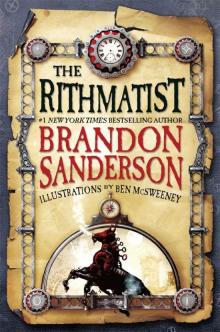 The Rithmatist
The Rithmatist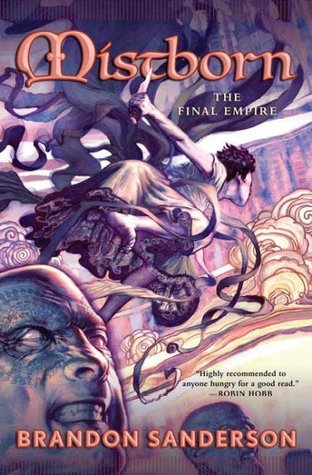 Mistborn: The Final Empire
Mistborn: The Final Empire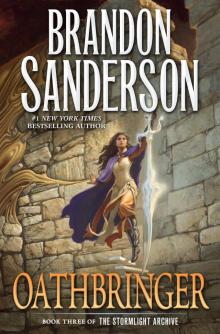 Oathbringer
Oathbringer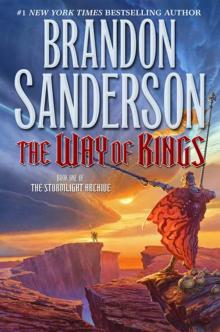 The Way of Kings
The Way of Kings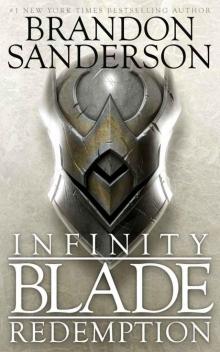 Redemption
Redemption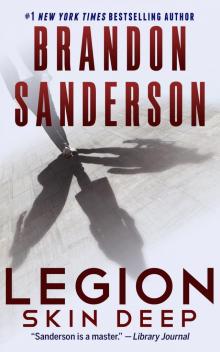 Skin Deep
Skin Deep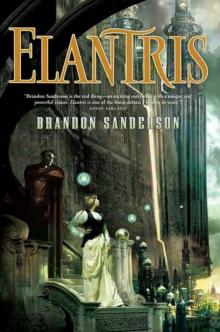 Elantris
Elantris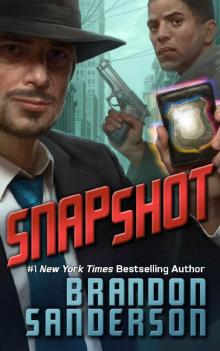 Snapshot
Snapshot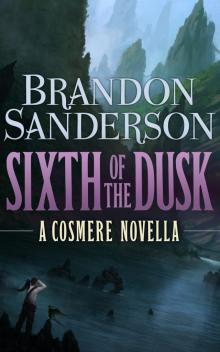 Sixth of the Dusk (Cosmere)
Sixth of the Dusk (Cosmere)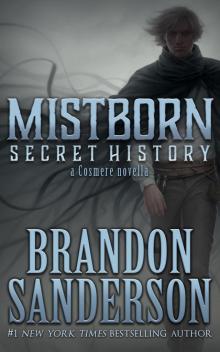 Mistborn: Secret History
Mistborn: Secret History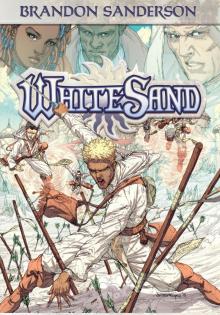 White Sand, Volume 1
White Sand, Volume 1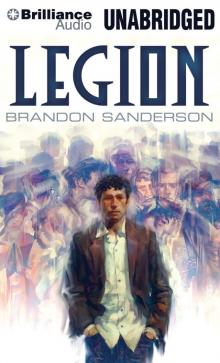 Legion
Legion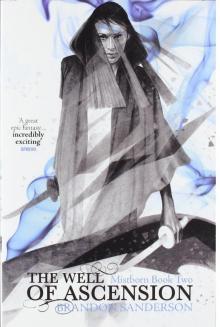 The Well of Ascension
The Well of Ascension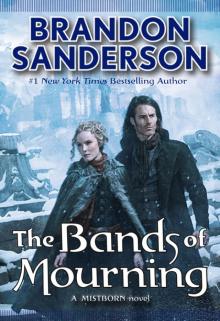 The Bands of Mourning
The Bands of Mourning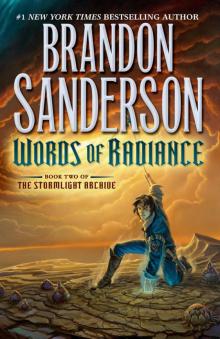 Words of Radiance
Words of Radiance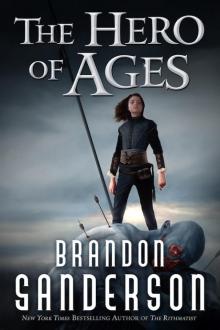 The Hero of Ages
The Hero of Ages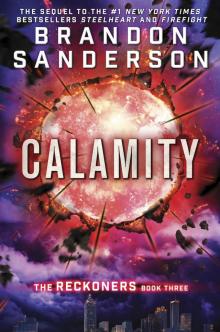 Calamity
Calamity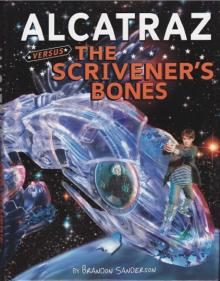 Alcatraz Versus the Scrivener's Bones
Alcatraz Versus the Scrivener's Bones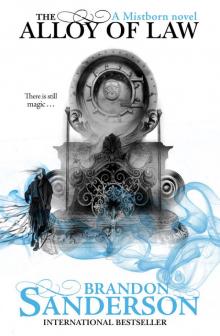 The Alloy of Law
The Alloy of Law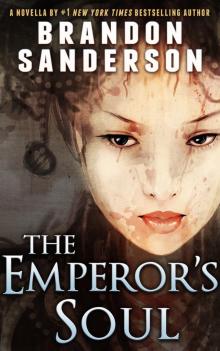 The Emperors Soul
The Emperors Soul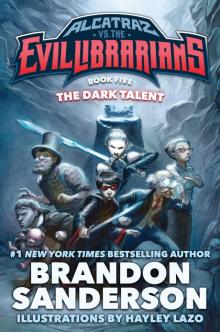 The Dark Talent
The Dark Talent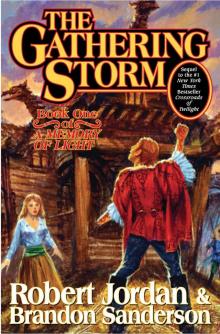 The Gathering Storm
The Gathering Storm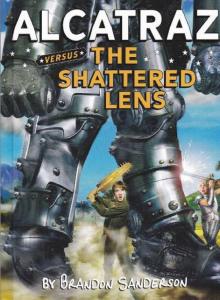 Alcatraz Versus the Shattered Lens
Alcatraz Versus the Shattered Lens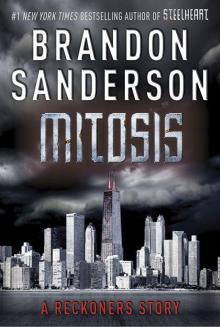 Mitosis
Mitosis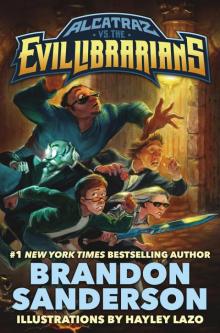 Alcatraz vs. The Evil Librarians
Alcatraz vs. The Evil Librarians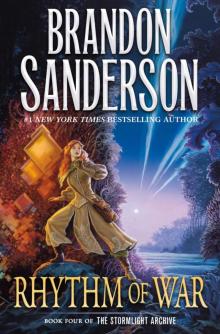 Rhythm of War (9781429952040)
Rhythm of War (9781429952040)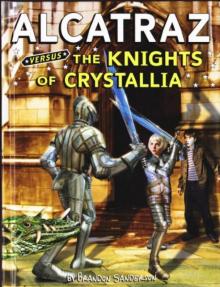 Alcatraz Versus the Knights of Crystallia
Alcatraz Versus the Knights of Crystallia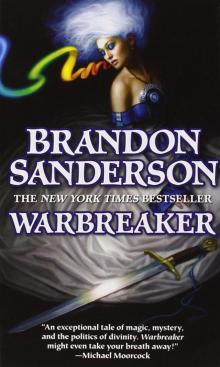 Warbreaker
Warbreaker Firstborn
Firstborn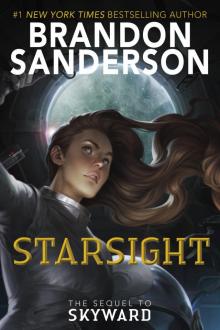 Starsight
Starsight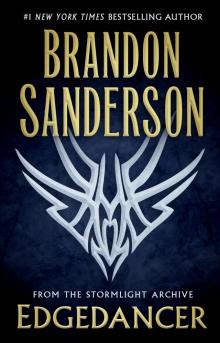 Edgedancer
Edgedancer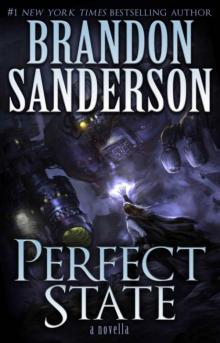 Perfect State
Perfect State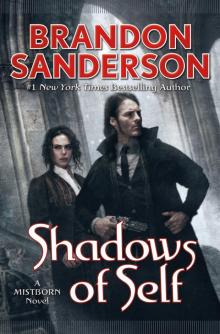 Shadows of Self
Shadows of Self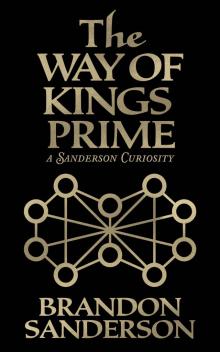 The Way of Kings Prime
The Way of Kings Prime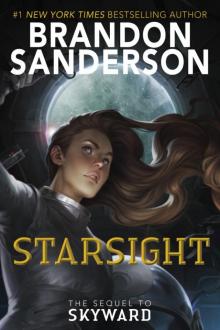 Starsight (US)
Starsight (US)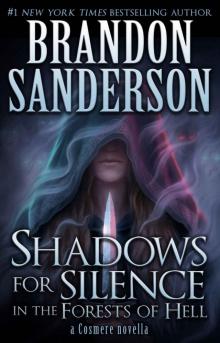 Shadows for Silence in the Forests of Hell
Shadows for Silence in the Forests of Hell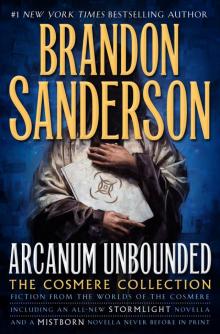 Arcanum Unbounded: The Cosmere Collection
Arcanum Unbounded: The Cosmere Collection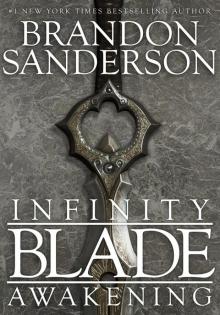 Awakening
Awakening Firefight
Firefight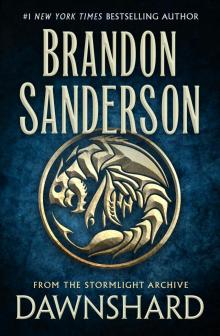 Dawnshard
Dawnshard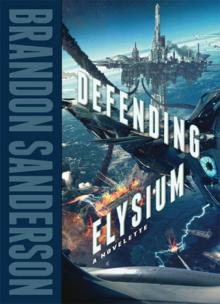 Defending Elysium
Defending Elysium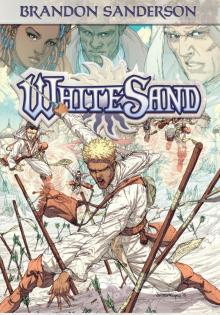 White Sand
White Sand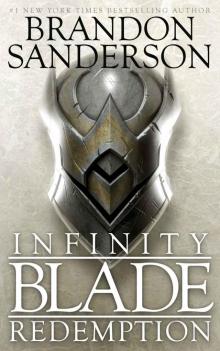 Infinity Blade: Redemption
Infinity Blade: Redemption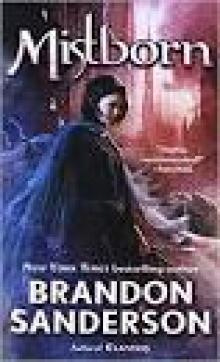 The Final Empire
The Final Empire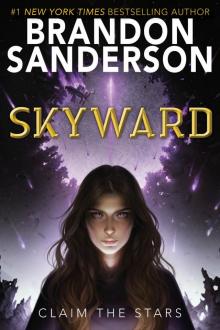 Skyward
Skyward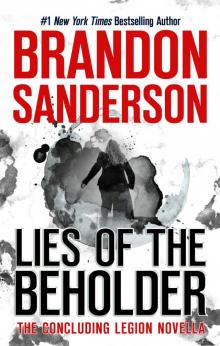 Lies of the Beholder
Lies of the Beholder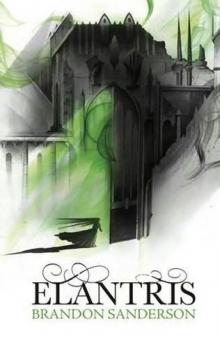 Elantris e-1
Elantris e-1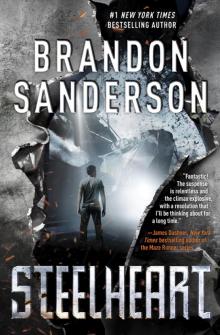 Steelheart r-1
Steelheart r-1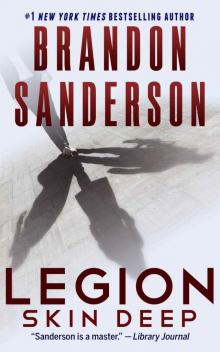 Legion: Skin Deep
Legion: Skin Deep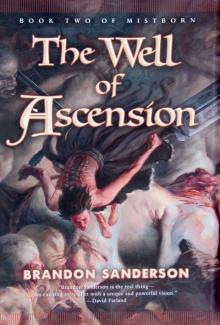 Well of Ascension
Well of Ascension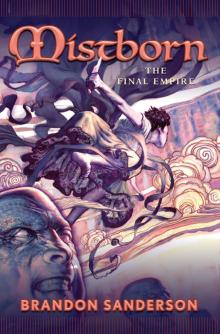 Mistborn
Mistborn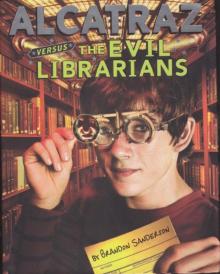 Alcatraz versus the Evil Librarians
Alcatraz versus the Evil Librarians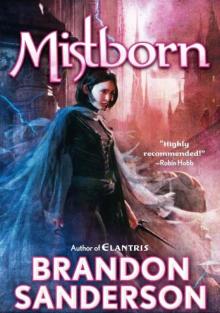 The Final Empire m-1
The Final Empire m-1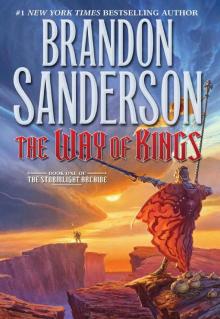 The Way of Kings (Stormlight Archive, The)
The Way of Kings (Stormlight Archive, The)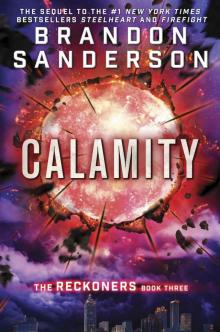 Calamity (The Reckoners)
Calamity (The Reckoners)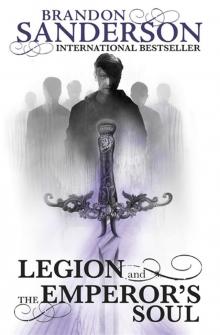 Legion and the Emperor's Soul
Legion and the Emperor's Soul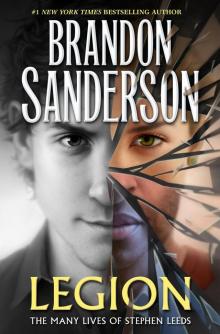 Legion: The Many Lives of Stephen Leeds
Legion: The Many Lives of Stephen Leeds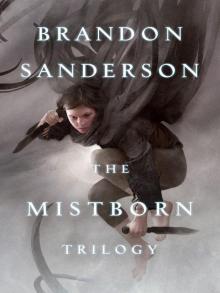 The Mistborn Trilogy
The Mistborn Trilogy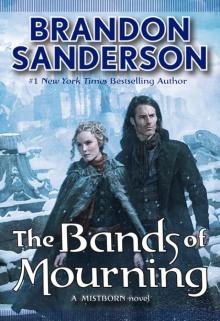 Bands of Mourning
Bands of Mourning Alcatraz
Alcatraz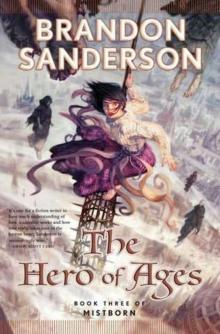 The Hero of Ages m-3
The Hero of Ages m-3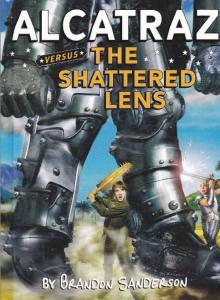 Alcatraz vs. the Shattered Lens
Alcatraz vs. the Shattered Lens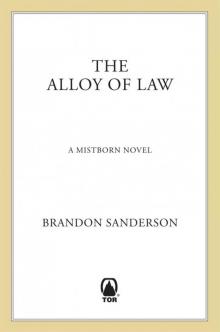 The Alloy of Law: A Mistborn Novel
The Alloy of Law: A Mistborn Novel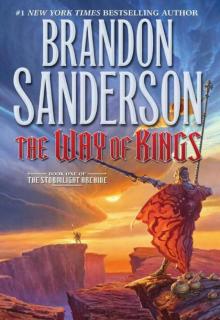 The Way of Kings sa-1
The Way of Kings sa-1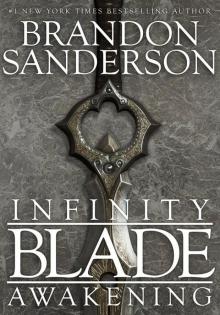 Infinity Blade: Awakening
Infinity Blade: Awakening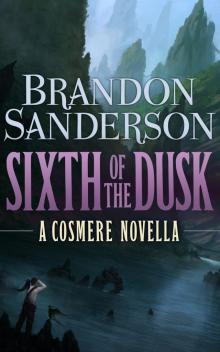 Sixth of the Dusk
Sixth of the Dusk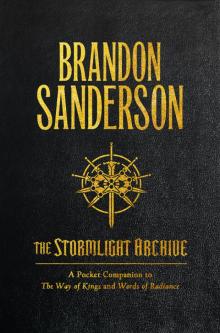 The Stormlight Archive
The Stormlight Archive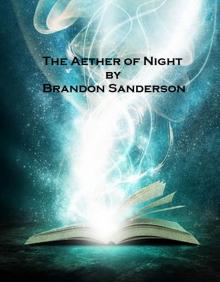 The Aether of Night
The Aether of Night